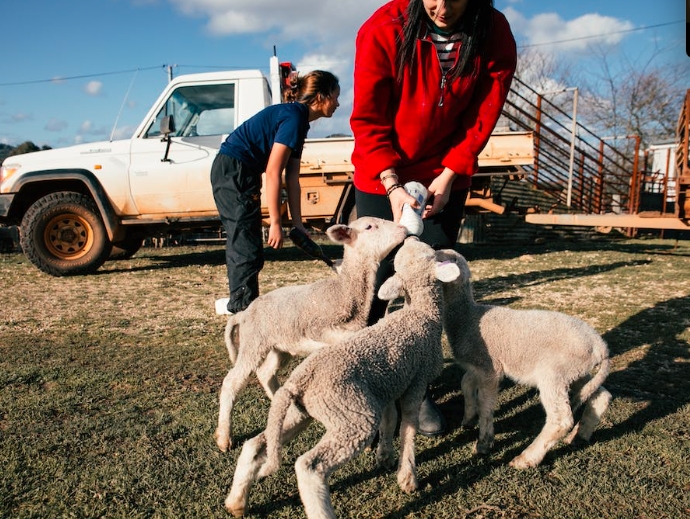Livestock care is an important part of farming and a crucial part of our economy and environment. Caring for livestock is essential for the success of a farm, as it reinforces the quality of the animals and their products, ensuring that the farmer can obtain the best possible returns for their investments. Furthermore, the welfare of these animals is an ethical responsibility, and providing them with the best possible care is a priority for those in the agricultural industry. Aside from the economic importance of livestock care, it can also have a positive effect on the environment. Properly managed farms with healthy livestock can produce a more sustainable food supply, helping to reduce the global impact of agriculture on the environment.
From a national perspective, the importance of livestock care is often overlooked. In the US, the agricultural industry contributes significantly to the national economy, with the livestock sector alone accounting for over $200 billion in GDP. However, this sector is highly dependent on the quality of care given to the animals, and any mismanagement can have serious economic consequences. Furthermore, the environmental impact of animal agriculture can be significant, and proper management of livestock can help to reduce this impact. With the increasing demand for animal products, it is essential that livestock care is given the attention it deserves, in order to ensure that the industry can remain a viable source of income for farmers, and a sustainable source of food for consumers.
Types of Livestock
Cattle: Cattle are hoofed animals that are primarily raised as livestock for meat and dairy products. They have a large muscular body, long legs, and a short neck. Cattle are typically hardy animals that require little maintenance, but they do need ample access to water and food, and must be sheltered in extreme weather conditions.

Pigs: Pigs are omnivorous mammals that are commonly raised for their meat. They have a large, barrel-like body, a long snout, and a thick skin. Pigs are highly intelligent animals that require a lot of attention and mental stimulation in order to thrive. They need access to water, food, and shelter, and should be provided with ample space to move around.
Poultry: Poultry are domesticated birds that are typically raised for their meat and eggs. They include chickens, geese, turkeys, and ducks. Poultry need access to food, water, and a safe place to sleep. They also need plenty of space to roam and flap their wings.
Sheep: Sheep are domesticated animals that are primarily raised for their meat and wool. They have a thick woolly coat, short legs, and a small head. Sheep are generally easy to care for, but they require access to food, water, and proper shelter. They also need regular grooming in order to prevent matting and shedding.
Benefits of Proper Livestock Care
Economic Benefits of Proper Livestock Care
• Proper livestock care is essential for the health and safety of the animals, their owners, and the community. It improves the quality of the product and increases the productivity of the animals. As a result, it can increase the economic value of the livestock, providing more financial benefits for the owners.
• Research has shown that the economic benefits of proper livestock care can be significant. For example, one study found that farmers in India who invested in improved animal husbandry practices saw their incomes increase by an average of 25%. Another study in the United States found that farmers who adopted improved management practices saw an average increase in production of 8%.
• Investing in proper livestock care can also reduce the cost of production. For example, improved animal husbandry can reduce the incidence of disease, which can lower the costs of veterinary care, drugs, and other treatments. Additionally, proper nutrition can reduce the costs of feed, while improved housing can reduce the costs of bedding and other supplies.
Environmental Benefits of Proper Livestock Care
• Proper livestock care can also have a positive impact on the environment. For example, improved animal husbandry can reduce the amount of manure produced, which can reduce air and water pollution. Additionally, improved management practices can reduce the amount of feed waste, which can lead to less land use and less soil degradation.
• Proper livestock care can also reduce the amount of greenhouse gas emissions from animal production. For example, improved nutrition can reduce the amount of methane produced by the animals, while improved housing can reduce the amount of ammonia emissions. Additionally, improved management practices can reduce the amount of energy used in animal production, which can further reduce emissions.
Social Benefits of Proper Livestock Care
• Proper livestock care can also benefit the social wellbeing of communities. For example, improved animal husbandry can reduce the risk of animal-borne diseases, which can protect the health of both animals and humans. Additionally, improved management practices can reduce the amount of stress on animals, which can improve their welfare and reduce the risk of animal cruelty.
• Proper livestock care can also benefit the local economy. For example, improved animal husbandry can increase the value of livestock products, which can lead to more jobs and increased incomes in the local economy. Additionally, improved management practices can reduce the costs of livestock production, which can lead to lower prices for consumers.
Essential Elements of Livestock Care
Nutrition:
– Nutrition is the foundation of livestock care.
– Good nutrition is essential for maintaining proper health, growth, and production.
– To ensure proper nutrition, it is important to provide a balanced diet that meets the nutrient needs of the species and meets the animal’s stage of growth or production cycle.
– It is also important to monitor the animal’s feed intake, as well as its body condition, to identify any nutrient deficiencies or imbalances.
– Practical tips for providing balanced nutrition include consulting a veterinarian or nutritionist, providing a variety of feed sources, and regular monitoring of the animals’ body condition and feed intake.
Housing:
– Housing is a very important component of livestock care.
– Proper housing can provide protection from the elements, as well as disease and parasites.
– It is important to provide adequate space and ventilation to ensure the animals’ comfort and health.
– Practical tips for providing proper housing include regular cleaning and disinfection, providing adequate space and ventilation, and providing comfortable bedding materials.
Disease Prevention:
– Disease prevention is critical for maintaining the health and well-being of animals.
– To prevent the spread of disease, it is important to practice proper hygiene, quarantine new animals, and regularly monitor the animals’ health.
– Practical tips for preventing the spread of disease include regularly cleaning and disinfecting the animals’ housing, providing clean water and feed, and practicing proper hygiene.
Animal Welfare:
– Animal welfare is an important part of livestock care.
– It is important to provide humane treatment of animals, to ensure that they are not subjected to unnecessary stress or suffering.
– Practical tips for providing humane treatment include providing comfortable and safe living conditions, providing adequate space and ventilation, and monitoring the animals’ behavior for signs of distress.
– It is also important to provide regular veterinary care to ensure the animals’ health and well-being.
Common Livestock Health Issues
Livestock are essential to the functioning of many farms and agricultural operations. Thus, it is important to understand what the most common health issues are that may affect livestock and how to recognize and treat them.
The most common health issues that affect livestock include:
• Respiratory Diseases: Infectious diseases such as bovine respiratory syncytial virus (BRSV), infectious bovine rhinotracheitis (IBR), and bovine viral diarrhea (BVD) can cause respiratory problems in cattle. Signs and symptoms include coughing, sneezing, nasal discharge, and difficulty breathing. Treatment may include antibiotics and/or antiviral medications.
• Gastrointestinal Disorders: Intestinal parasites, such as roundworms and coccidia, can cause diarrhea, weight loss, and anemia in livestock. In addition, bacterial infections such as Salmonella and E. coli can also cause gastrointestinal problems. Treatment typically involves deworming and antibiotics.
• Reproductive Issues: Reproductive issues, such as infertility and miscarriage, can occur in livestock. These issues can be caused by nutritional imbalances, infections, and other health problems. Treatment may include antibiotics, hormones, and other medications.
• Skin Diseases: Various bacterial and fungal infections, such as ringworm and dermatophilosis, can cause skin diseases in livestock. Treatment may include topical ointments, antibiotics, and/or anti-fungal medications.
• Foot Rot: Foot rot is a bacterial infection that affects the hooves of livestock. It is caused by a combination of bacteria that can enter the hoof through a cut or other break in the skin. Treatment may include antibiotics and/or footbaths.
• Laminitis: Laminitis is a painful condition that affects the hooves of livestock. It is caused by an inflammation of the sensitive laminae of the hoof, which can be caused by dietary imbalances, overuse, or other conditions. Treatment may include antibiotics, anti-inflammatory medications, and dietary changes.
Regular veterinary check-ups and vaccinations are important for the health of livestock. Vaccinations can help prevent infections, while veterinary check-ups can help identify health issues in their early stages. Early detection and prompt treatment of health issues can help prevent further complications and ensure the longevity and well-being of livestock.

Ethical Considerations
Ethical Considerations of Livestock Care
1. Animal Welfare: Standards must be established to ensure that animals are not subject to unnecessary suffering or exploitation. This includes providing appropriate housing and living conditions, as well as considering the animal’s age, physical condition, and behavior when determining the appropriate care.
2. Sustainability: Livestock farming must be conducted in a way that is sustainable and responsible, so as to ensure that the environment and resources are not damaged to an extent that would have long-term consequences. This might include reducing the amount of land used for grazing and adopting more efficient farming practices.
3. Social Responsibility: As well as ensuring the ethical treatment of animals, livestock farmers must also consider their social responsibilities, such as being mindful of their local communities and other stakeholders who may be affected by their farming practices.
Ethical Challenges and Controversies Surrounding Modern Livestock Farming Practices
1. Factory Farming: Factory farming is the practice of raising large numbers of animals in confined spaces, often in unnatural and uncomfortable conditions. This type of farming has been criticized for its potential for animal cruelty and for its negative environmental impacts, such as pollution and the overuse of water and other resources.
2. Antibiotic Use: The use of antibiotics in livestock farming has been a contentious issue, as it can lead to the spread of antibiotic-resistant bacteria. This can be a threat to both human and animal health, and as such, calls have been made to reduce the amount of antibiotics used in livestock farming.
3. Animal Rights: Animal rights activists have long argued that animals should be treated with respect and not subjected to unnecessary suffering. They have called for an end to practices such as factory farming and the use of growth hormones and have advocated for more ethical farming methods.
Conclusion
Livestock love is an important factor to consider when it comes to caring for animals. By providing appropriate food, housing, care, and attention, livestock owners can ensure that their animals remain healthy and happy. Furthermore, taking the time to understand the unique needs of the species and providing individualized attention can help build a bond between the owner and their animals. Ultimately, providing quality care for livestock is essential to ensuring their health and well-being and creates a positive relationship between the owner and their animals. Livestock love is a necessary part of caring for animals, and it provides both physical and emotional benefits to the animals and their owners.
FAQs
1. What is livestock love and why is it important?
Livestock love is the practice of caring for and nurturing livestock in an ethical and humane manner. It is important because it promotes the health and wellbeing of animals and helps ensure their quality of life.
2. How can I show livestock love?
You can show livestock love by practicing good animal husbandry, providing clean and comfortable living conditions, providing adequate food and water, and providing regular veterinary care.
3. What are the benefits of livestock love?
The benefits of livestock love include improved animal health and welfare, better quality products, and reduced environmental impacts.
4. What are the ethical considerations of livestock love?
Ethical considerations of livestock love include avoiding overstocking, ensuring humane slaughter, and providing proper care and nutrition.
5. What are the environmental impacts of livestock love?
The environmental impacts of livestock love can include reduced water and land pollution, reduced emissions of greenhouse gases, and improved soil fertility.
6. What is the best way to ensure the wellbeing of livestock?
The best way to ensure the wellbeing of livestock is to provide them with the best possible care and nutrition, and to give them plenty of space to move and explore.
7. How can I ensure a healthy and humane lifestyle for my livestock?
To ensure a healthy and humane lifestyle for your livestock, you should practice good animal husbandry, provide clean and comfortable living conditions, and provide adequate food and water.
8. What measures can I take to protect my livestock from disease and stress?
To protect your livestock from disease and stress, you should practice good animal husbandry, provide regular veterinary care, and use disease prevention strategies such as vaccination and quarantine.
9. What are the best practices for caring for livestock?
The best practices for caring for livestock include providing clean and comfortable living conditions, providing adequate food and water, and providing regular veterinary care.
10. How can I ensure that my livestock are treated humanely?
To ensure that your livestock are treated humanely, you should practice good animal husbandry, provide adequate food and water, and provide regular veterinary care. You should also avoid overstocking and ensure humane slaughter.


















